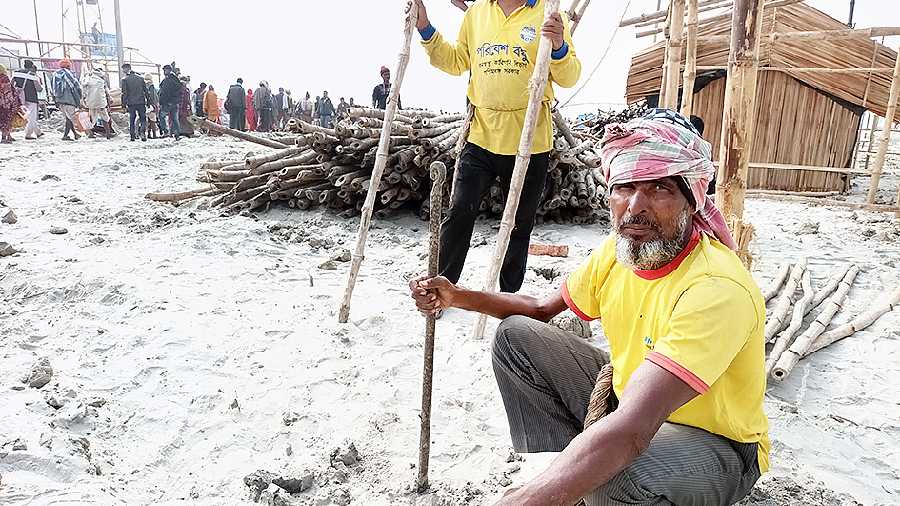Sheikh Mursalim, who has been working as a construction labourer in Kerala’s Malappuram district for the past 13 years, often missed his home in Kalibazar, South 24-Parganas, on Id.
But Gangasagar Mela — the second-largest congregation of Hindu pilgrims after Kumbh — has always drawn him back to his home state.
Mursalim is among thousands of youths belonging to the Muslim community, who were forced to leave Bengal in search of livelihood. They return to Bengal for a couple of months during Gangasagar Mela to benefit from the multiplier effect of the mega event, which has been growing in size in the past few years following patronage from the state government.
“This Mela is a great income opportunity for us.... It is not only me, but you can find several hundred people like me, who have returned to their villages for Gangasagar Mela,” said Mursalim, who was busy setting up a tent on the beach near sage Kapil temple.
Serajul Ali Khan, a resident of a village on Sagar Island, is another example of temporary reverse migration from Kerala as he has been working on the sprawling Mela premises for the past two months.
“I earn around Rs 30,000 a month by working here.... It’s a handsome amount as I am earning by living at home, which allows me the opportunity to spend time with my family,” he said.
The Gangasagar Mela started from January 8 and the state government is expecting a footfall of around 30 lakh this time. The maximum rush will be on January 14 and 15 because of Makar Sankranti, said a senior official in Gangasagar.
“Already, over 20 lakh pilgrims have either reached or approached the Sagar island from different corners for a holy dip on the occasion of Makar Sankranti,” he said.
The holding of the Mela is an elaborate affair and the government creates the necessary infrastructure to house the pilgrims, who come from different parts of the country. Every year, the government spends hundreds of crores for the temporary construction of tents, hangers, and huts on the beach of Sagar Island, Namkhana and Kakdwip for the accommodation of pilgrims, police personnel, officials and others.
Rough estimates suggest that over 30,000 workers get engaged in Gangasagar to make the arrangements. This year, the size of the labour force is in excess of 40,000.
“We had started the preparation of putting up tents, and pandals from November.... As there is a huge demand for labour, thousands of migrant workers return to their homes to work in government projects. The tradition of homecoming, irrespective of the religion of the local migrant workers, has been there for years, but the size of the workforce returning to their villages for the Mela has been growing since 2018 when the scale of the Mela got bigger,” said Raju Das, an assistant engineer of South 24 Parganas district administration.
Sagar Island which falls under South 24-Parganas has a 2.5 lakh population in total and 12.5 per cent of those are Muslims. A significant portion of the working age population of the region are migrant workers.
“Those coming back to the state for a couple months for the Mela have a sizable Muslim population,” said a source in the district administration,
The involvement of Muslims is not limited to construction work for the Mela, he said. “People from local areas benefit by putting up stalls or working in the transportation sector,” he added.
This year, the Mamata Banerjee government has taken multiple initiatives in the religious gathering to conduct the event in a more gorgeous manner to draw the attention of visitors from outside Bengal. The state government is also making special efforts as it has decided to apply to Unesco for an intangible heritage tag for Gangasagar Mela.
A senior official involved in Gangasagar Mela management said that after the Mamata Banerjee government took initiatives to promote the religious event, fund allocation for the event increased many fold.
“The local administration has made it mandatory that every contractor has to pay 14 per cent of the total project cost as wage to the labourers. That makes the event really labour friendly,” explained an official.










